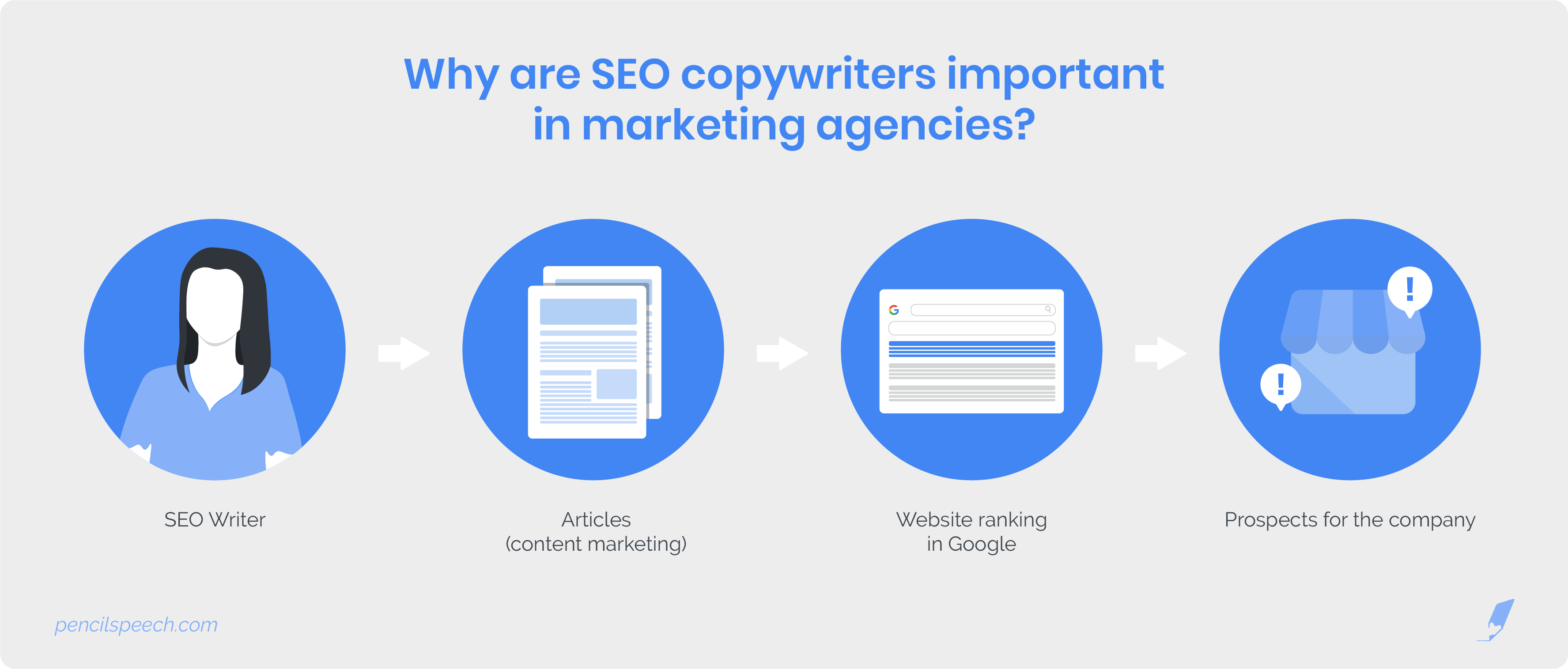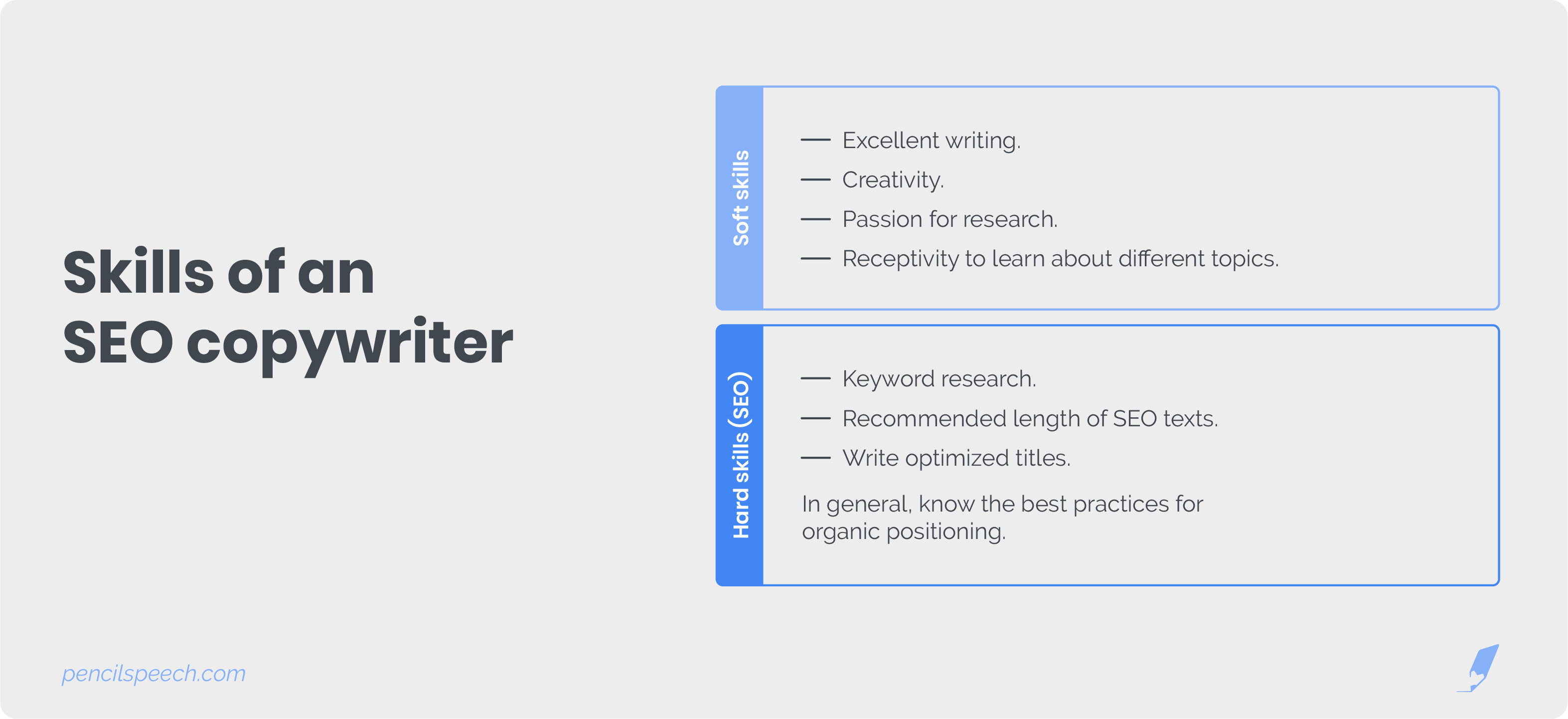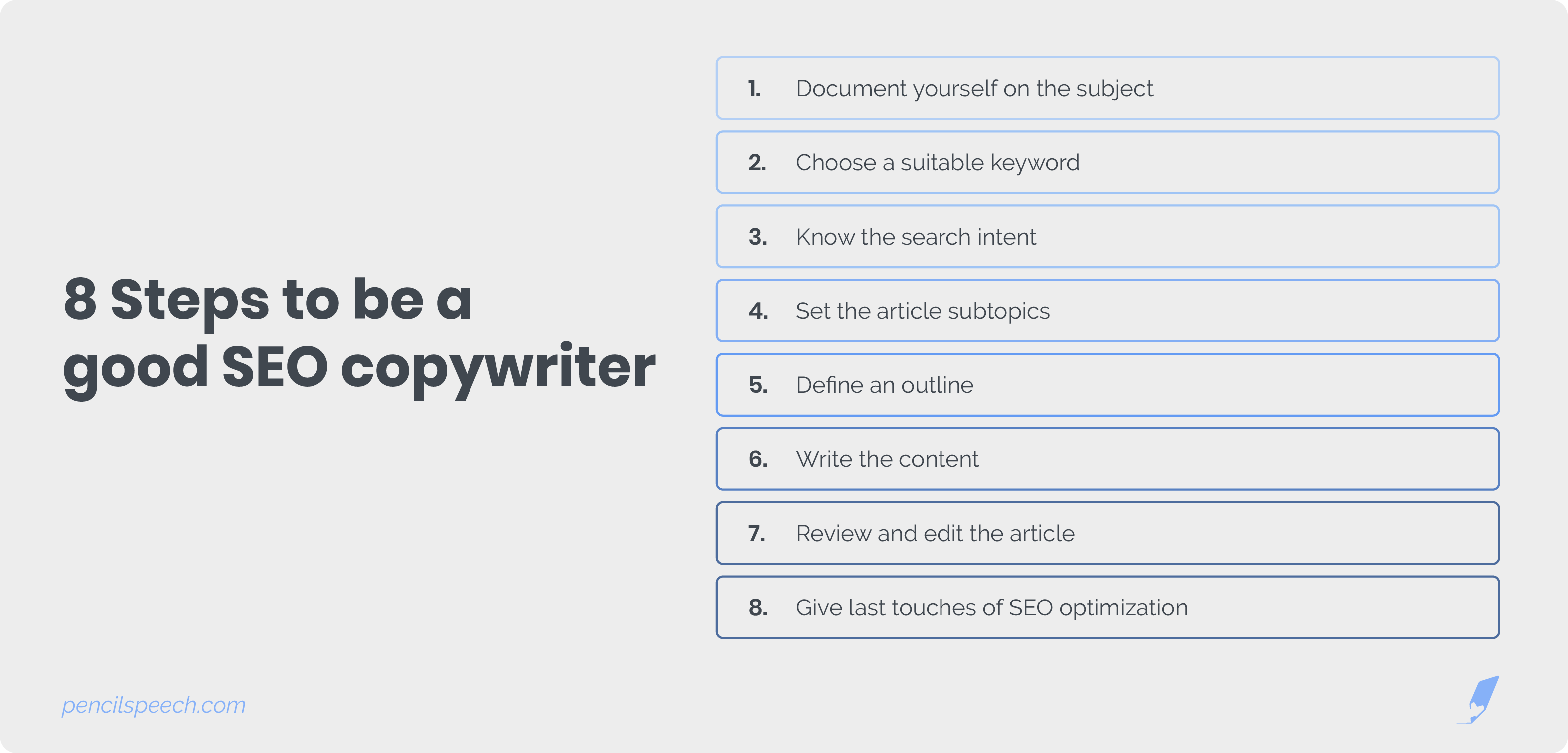The SEO copywriter is one of the most requested professionals today for website management. He knows the 8 steps to be the best.
What is an SEO copywriter?
An SEO copywriter is a person who specializes in creating content that ranks at the top of search engine results.
He is characterized by his strengths both in writing (spelling, information synthesis) and in technical knowledge of organic positioning (keyword searches, knowing the search intention of users, etc.).
Why are SEO copywriters important in marketing agencies?
SEO or search engine optimization is a set of strategies used to improve the organic positioning of websites on Google.
Its main way to get a website to rank in Google is through content marketing, that is, texts that answer all the questions of the users about a specific topic.
An SEO editor is the person in charge of creating these articles, which allow a site to position itself in Google.
For this reason, companies, public organizations, personalities and other institutions require the services of SEO writers who are able to create relevant and optimized content to help them conquer search engines.

SEO copywriter vs artificial intelligence tools
There are now artificial intelligence (AI) tools that can generate full text from existing information on the Internet, and many people (including copywriters) wonder if these software can replace the SEO copywriter.
Although these are relatively young technologies and are constantly evolving, these tools currently have some significant limitations, including:
- Although these softwares can create texts that are grammatically correct, they often generate meaningless content or present incorrect information.
- These tools can generate text with a lot of redundancies, or repeat common words or phrases, which decreases the quality of the content and affects its SEO optimization potential.
- The quality of the information in the content generated by these AI tools depends on the quality of the databases with which they are fed or to which they have access.

And how does this affect the work done by an SEO copywriter compared to that done by artificial intelligence?
- An SEO copywriter or SEO agency generates content for corporate clients on specific topics. If the AI tool generates nonsensical text, or presents incorrect information, this has a very negative impact on the client’s reputation and credibility.
- AI tools can generate texts with some consistency, but they do not control plagiarism or copy-paste, nor do they make references to the information sources consulted.
- A client using an AI at this time is exposed to a high risk of plagiarism, with all the drawbacks that this implies.
- AI tools use information available on the Internet. This means that, in addition to the possibility of plagiarism, there is the risk that AI-generated content will give more relevance and visibility to the competition than to the client itself.
- AI tools currently focus on generating texts, but these do not include SEO optimization, which must be carried out separately by a specialized copywriter.
By comparison, let’s look at some of the advantages of SEO copywriter over AI tools:
- The SEO editor generates texts that meet the specific requirements of the client.
- As we have seen before, an SEO writer will avoid plagiarism, copy-paste, self-plagiarism, cannibalization and any other practice that affects his own reputation and that of his client at all costs.
- The SEO writer can identify and use the particular characteristics of the client’s products or services to generate original and differentiated content that outperforms the competition.
- An SEO copywriter can identify and select the most relevant sources on a topic or industry, unlike an AI tool that only processes information without filtering or evaluating the quality of the sources.
So, for now, the SEO copywriter has significant advantages over artificial intelligence tools and the work from it will be of a better quality than that generated by any software available today.
How to train as an SEO copywriter?
To train as an SEO writer there are no prerequisites. It only takes commitment, dedication and perseverance.
On the one hand, learning the techniques, tools and strategies to do quality SEO optimization requires time and effort.
On the other hand, there is currently a lot of competition in this field so, to stand out, you need to develop your abilities to the maximum. There are two ways to achieve this:
- Training as a freelance SEO copywriter: it is an attractive option if you want to get involved in the world of SEO at your own pace and be your own boss. Your learning will be self-taught and you will have to compete with other freelance writers from all over the world to make a name for yourself and attract clients.
- Training as a copywriter for an SEO agency: it will allow you to learn systematically and take advantage of all the experience accumulated by the agency. You will have to adapt to their rhythms, dynamics, conditions and work styles.
In both cases, you will need to invest time and effort, but the results are worth it. Additionally, many SEO copywriters have trained and gained experience working for SEO agencies and then go freelance.
On the other hand, some freelance SEO writers are very successful and decide to go a step further and found their own SEO content agencies.
Skills and knowledge of an SEO copywriter
A good SEO copywriter should have basic knowledge about:
- Keyword research.
- Best practices for creating SEO content.
- Recommendations for title articles that rank in Google.
Additionally, a good SEO copywriter should have:
- Excellent spelling, command of grammar and writing skills.
- Creativity. A large part of the information on any subject (if not all) is already published on the Internet. The SEO writer must have the ability to present the content in original ways, which stand out and differ from the existing ones.
- Ability to adapt to different themes, requested by a wide variety of clients.
- Passion for research, to find the best sources that will support the texts to be written.

A good SEO copywriter should avoid:
- Plagiarism: presenting as your own texts written by other people or institutions is unethical and is one of the most rejected practices in this industry.
Additionally, it can lead to legal problems, economic and criminal sanctions, as well as the loss of credibility of the SEO writer and damage to the reputation of his client.
- Copy-paste: copying and pasting textual information from other sources, as if they were a puzzle, to generate “new” content is another practice that should be avoided.
Copy-paste is a form of plagiarism and also shows a lack of creativity and professionalism on the part of the person who does it.
- Self-plagiarism: Plagiarism is not just copying material from other sources. Self-plagiarism exists when materials previously published by the same editor are copied verbatim without making proper references.
- Cannibalization: Another practice associated with self-plagiarism is cannibalization. This occurs when different articles that refer to the same content are generated.
To avoid cannibalization, it is recommended to generate articles on specific topics, with well-defined scopes and, if necessary, establish links to other articles on related topics of interest that expand the information.
8 Steps to be a good SEO copywriter
Here are some tips to be a good SEO copywriter:

Document yourself on the subject
An SEO copywriter must be able to write on any topic that is required. That does not mean that he has to be a specialist in the area, but he does have to be a good researcher.
Thus, it is recommended that the SEO writer, in the course of his research:
Use authoritative sources: this means looking for the primary sources of information, such as the most relevant organizations, institutions or companies on a topic.
For example, if you are writing an article on health topics, the World Health Organization (WHO) and the International Committee of the Red Cross (ICRC) are highly relevant authoritative sources.
Consult the experts: If you have the opportunity, consult an expert or professional in the area. That will help you focus your ideas, express them better, become familiar with the technical language of that industry and use it appropriately.
There are certain words that have different meanings in different areas and recognizing that is very important when writing an article. For example, the term “matrix” refers to a very different concept in medicine, mathematics, engineering or communication.
In addition, having primary sources gives the article a great competitive advantage, since it will not only be supported by information obtained on the Internet, but also by exclusive knowledge acquired from years of personal experience.
Check multiple sources: One source is not enough. It is important to consult as many as necessary to gain a wealth of opinion and greater understanding on a specific topic.
Ultimately, the quality of the research is reflected in the quality of the content developed by the SEO copywriter.
Choose a suitable keyword
The choice of a suitable keyword is one of the fundamental elements of the success of an SEO optimization.
Keywords are actually phrases that Google’s algorithm uses to index, target, and match results when a query is made. Keywords are classified into short tail, middle tail and long tail:
- Short tail (short tail): consist of one or maximum two words. Because they are too generic, queries for these keywords return millions of results, so they can only be used effectively by websites with a high reputation in their area.
- Middle tail (median tail): are terms of three or four words. They are less generic than short tail, but even so, queries with these keywords return too many results, so they are not recommended unless it is a niche, little-known or competitive area.
- Long tail (long tail): they are phrases with their own sense and meaning, which refer to a specific matter. They are the standard in SEO optimization for low to medium authority websites.
As a general rule, the use of long tail keywords is recommended, as well as their different variants.
Know the search intent
Before starting to develop the content for an article, the SEO writer must have a clear idea of the characteristics of the project and the search intention of the user or potential client. For this, he must consider the following aspects:
Content format: can be short format (short format) or long format (long format). Short format content is up to 300 or 400 words long, while long format content is at least 800 words.
Currently, it is recommended to write articles between 1,500 and 2,000 words to obtain better positioning.
Type of content: the purpose of the content must be defined. In this sense, the contents can be detailed informative guides, lists, comparative guides, practical guides (with step-by-step instructions), rankings, reviews, among others.
Set article subtopics
Once the investigation is carried out, the appropriate keyword is selected and the format and type of content are defined, it is necessary to define the sub-themes or topics that are going to be discussed in the article, so that they are informative elements that add value to the article. the post.
An SEO copywriter must learn to balance length and scope of content.
An ideal article is specific enough to meet user expectations, but not so long that it loses focus and tires the reader.
Draw up an outline
To avoid the problems described in the previous section, it is recommended to make an outline or scheme before starting to develop the content. In this way, the SEO writer can generate a priori a tentative index of the article, which will serve as a reference for its preparation.
Within this scheme, the subtopics must be logically distributed and have a proportional extension to maintain the harmony of the content.
For example, if the article is 1500 words long and 5 subtopics are considered, each one of them should have an approximate length of 300 words, to keep the structure of the publication balanced.
Likewise, the correct use of titles and subtitles is important. The main title and at least one of the relevant subheadings must contain the keyword, to help position the article in Google.
Write the content
At this point, an SEO copywriter puts into practice his writing skills, his creativity, what he learned in the research phase and a broad but simple vocabulary, to start creating the publication.
The writing style will depend on the type of article, the nature of the topics, the website where the text will be published and the profile of the user to whom the publication is directed.
In general terms, a natural and flat writing is recommended that engages the reader and, above all, clearly answers his questions and concerns.
Paragraphs of more than 3 or 4 lines should be avoided and the technical or specific terms of the area should be used with precision.
Review and edit the article
A quality writer knows that a text is not finished by the time the first version is finished.
That’s just a starting point for future revisions that will result in a polished and round text.
As a rule, the writer should edit his copy at least once before delivering it to the client or agency he works for. This will catch redundancies, typos, and any details that were impossible to identify at the time of writing.
It is possible that later editions by a Product Manager or specialized proofreader will follow. The procedure will depend on the work dynamics in each situation.
Add details to optimize the article
An SEO writer knows how to apply web optimization techniques, including the selection of SEO titles and subtitles, the use of images and tables, the frequency of keyword use in the content and the creation of internal and external links.
Some optimization techniques focus on search intent. Others, like local SEO strategies, take into account whether the post is designed to have a targeted geographic reach.
Regardless of the case, giving the article a final reading with the eyes of an SEO consultant will increase the chances that the result will be ready to be positioned in the search engines.
How much does an SEO copywriter earn?
- How much an SEO copywriter earns depends on a few factors:
- If you are a freelancer or work for an agency.
- The language and length of the content you create.
- The number of items you make.
- The experience you have.
- If it is recognized in the area.
Freelance SEO writers generally bill their services under one of the following modalities:
- Price per hour: it is a method used to establish prices, but it is not recommended for an SEO copywriter, because it is very difficult to calculate in advance the time required to prepare SEO content.
- Price per word: it is a simple and widely used way of billing SEO writing services. Prices can be very variable, ranging from USD 0.010 to more than USD 5 per word. The disadvantage is that you have to adjust the texts to the agreed number of words.
- Price per content: it is the most recommended way to stipulate the price of SEO writing and optimization services. That way, both the writer and the client agree on a rate for a given amount and quality of work and stick to it. In Latin America, prices per item range from USD 4 to USD 50.
Although prices and frequency of jobs vary greatly, let’s say an SEO writer charges an average of 10 USD for a 1,500 word content article, and can produce 1 article per day. If she works 5 days a week, it means that she would be billing around 200 USD per month.
Another scenario is that the SEO copywriter works for an agency. In this case, the editor’s fees are negotiated by mutual agreement with the agency according to the assigned responsibilities, conditions and volume of work.
What is the profile of the Pencil Speech SEO writer?
At Pencil Speech we privilege excellence, assertive communication, proactivity, creativity, teamwork and continuous learning.
It is not essential that the candidate for a Pencil Speech writer have previous experience in SEO optimization, since this knowledge and skills can be acquired by working with the agency.
However, he does need to have good spelling, basic grammar, and writing skills.
Final thoughts
The SEO copywriter is a professional who specializes in creating content for websites that are optimized to rank on Google.
These knowledge and skills are in high demand by any organization that wishes to make itself known on the Internet.
An SEO writer must possess a series of qualities that allow him to stand out in a sought-after field of work, but also increasingly dynamic and competitive.
If you meet this profile and are interested in learning more about SEO, do not hesitate to reach out.



